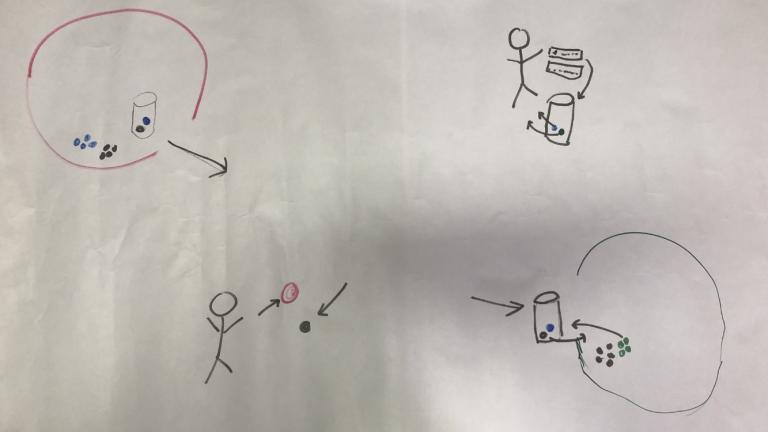Children do not only develop outwardly, their faith also changes with age. Youth leaders need to be aware of this and shape their messages accordingly
Time of Grace (0-7/9 years)
Experiencing Grace
- Take in the message of grace with care – as a store for later
- Experiencing goodness and security with all the senses
- Translating God into the lives of children through action
- Fixed habits and rituals help the child understand the meaning of faith before they understand the content
becoming linguistic
- Concepts like „faith“ and „trust“ are fleshed out through stories
- Song lyrics stand up to life experiences and pr Good song lyrics w
- „To whom I belong, I belong.“
Recording Biblical Content
- Depending on contemplation: „No impression without expression“
- Stories and narratives conspire to form inner images that sink down into the subconscious and work from there
- Breaks and repentance are only tangible for teenagers and adults!
- Miraculous hearts do not yet prepare for joy. Parents have more possibilities at their disposal than the child can imagine
- The child identifies with heroes and role models, sense of justice
- Do not overburden the child in moral-ethical decisions
>Contents up to about 8 years:
- Stories with the message of God's goodness: YOU are wanted
- Stories that show God and Jesus as acting and creating
- Stories of Jesus proclaiming God's love for people
- Stories that interpret the meaning of the great feast
- Tales of miracles that portray God's omnipotence or Jesus' authority (not just telling miracle stories)
- Narratives that show consequences of human behavior for good and Bösen
- AT: primal stories (creation), father stories (Abraham), Joseph story
- NT: Christmas story, childhood of Jesus
- Topic circles: healthy and sick (Bartimäus), joy and fear (sea storm), celebrating feasts (wedding and baptism), workers from abroad (Ruth)
> Talking to Jesus üabout the child more than talking to the child üabout Jesus
Guilt and Forgiveness
- „Saying sorry“
- As a social rule, this makes sense
- for his reactions, however, is questionable
- „I did that,“ admit guilt
- I am allowed to make mistakes without having to accept loss of love
Image of God
- Does the child need to endear himself to God?
- Are educators/leaders aware of their own image of God?
- Only carefully überprprueftes understanding of God.
Time of Law (7/9-11/13)
Tracing realistic, real events
- In the realität period, the child is interested in „action“
- Ideal of justice, punishment of the Bösewicht
- Historical – geographical contexts, competitions, sense of order, collecting frenzy, and ritualization of action
- In contrast to the pre- and post-latency phases: physical-cognitive rather than physical-emotional drive
- Right, will-power, the good deed – because it is „right“ and not out of mercy
- History as a timeline is understood
events
Teaching material and biblical content
- Bible study especially at age 10-12!
- AT: Exodus, 10 Commandments, covenant making, land grabbing, Judges period, Samuel to Saul, David – Jonathan, Israel's glory and decline, Elisha – Elisha, Jeremiah, Bab. Captivity
- NT: John the Baptist, Jesus and the Teachers of the Law, Passion Narrative and Acts (ages 11 and up), action-packed parables, general coherent texts
- God as a covenant partner, faith teaching (catechism) because code of conduct and rules of the game are part of age
- Miracles are not as easily accessible from about age 11
Character Formation
- Real sense of guilt: formation of conscience
- Children keenly observe how closely adults take the truth
- Taking doubts about children's faith seriously
- Sense of order is formed; lessons with a firm framework, disciplinary arrangements adhered to
- We owe the child a sense of purpose in education, youth program and instruction
- Memorizing, opening passages, learning psalms: biblical knowledge as a foundation
- Theater, experiential program, camp, …
- Introducing yourself to others becomes möpossible
Gospel Time (11/13-16+)
Character Development
- Even „irreligious adolescents“ are concerned üabout their own existence
- Do not give rash answers
- Youth need times of alone time and times of community
- The conversational atmosphere before puberty is the foundation for conversation during puberty
Religious and Biblical Theme
- The feeling level is considered the key to questions of faith – but for the time being, without having to talk about oneself (telling stories of other people)
- The lives of the young people themselves determine the lesson content more than the biblical stories
- Biblical figures as radical types: John the Baptist, Jeremiah, Job, Peter,…
- Exploring miracle stories at the symbolic and experiential level
- Youth literature and biographies, experiential stories of Christians, of ex-drögels, disabled people, missionaries, …
- Image meditations, films, music
- Tangible role models help with persönity building, role models to reject and accept
- Involve young people in responsibility
- Clear agreements, combine humor with clear direction
- Create an atmosphere, design the space
Theological statements
- God's image, guilt and forgiveness, hope and discipleship as central basic motifs, which can be unfolded by various themes of the
- True engagement with the doubts of young people. Those who are taken seriously as doubters take others seriously as believers.
- Models of common life sniffing up close, rudimentary to experience. Question of meaning from the thought of the common and the relationship of the develop.
- Binding community forms (also in the partnership) as mögliche life goals develop. (Based on thoughts of the covenant rheology)
Source reference
- Title image: Juropaarchiv, www.juropa.net
- Content and literature:Felix Studer, Theologisch-Diakonisches Seminar Aarau, 2004 (course materials) building on: Bridger, Francis: How Children Believe, (Oncken, Wuppertal and Kassel and Bibellesebund Winterthur, 1990) and on Rinderknecht Hans Jakob and Zeller Konrad: Methodik christlicher Unterweisung (Zwingli Verlag Zurich/Stuttgart 1968);
Content may be automatically translated. Help improve the quality of the translation with your editing!



